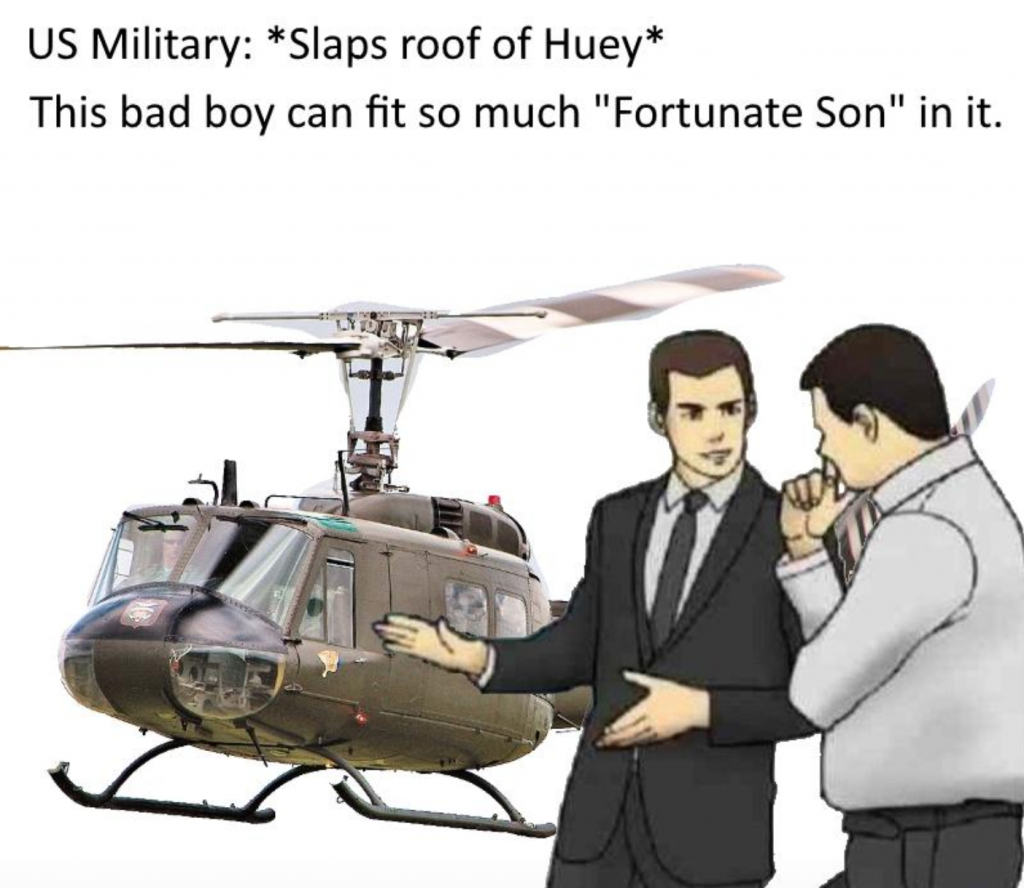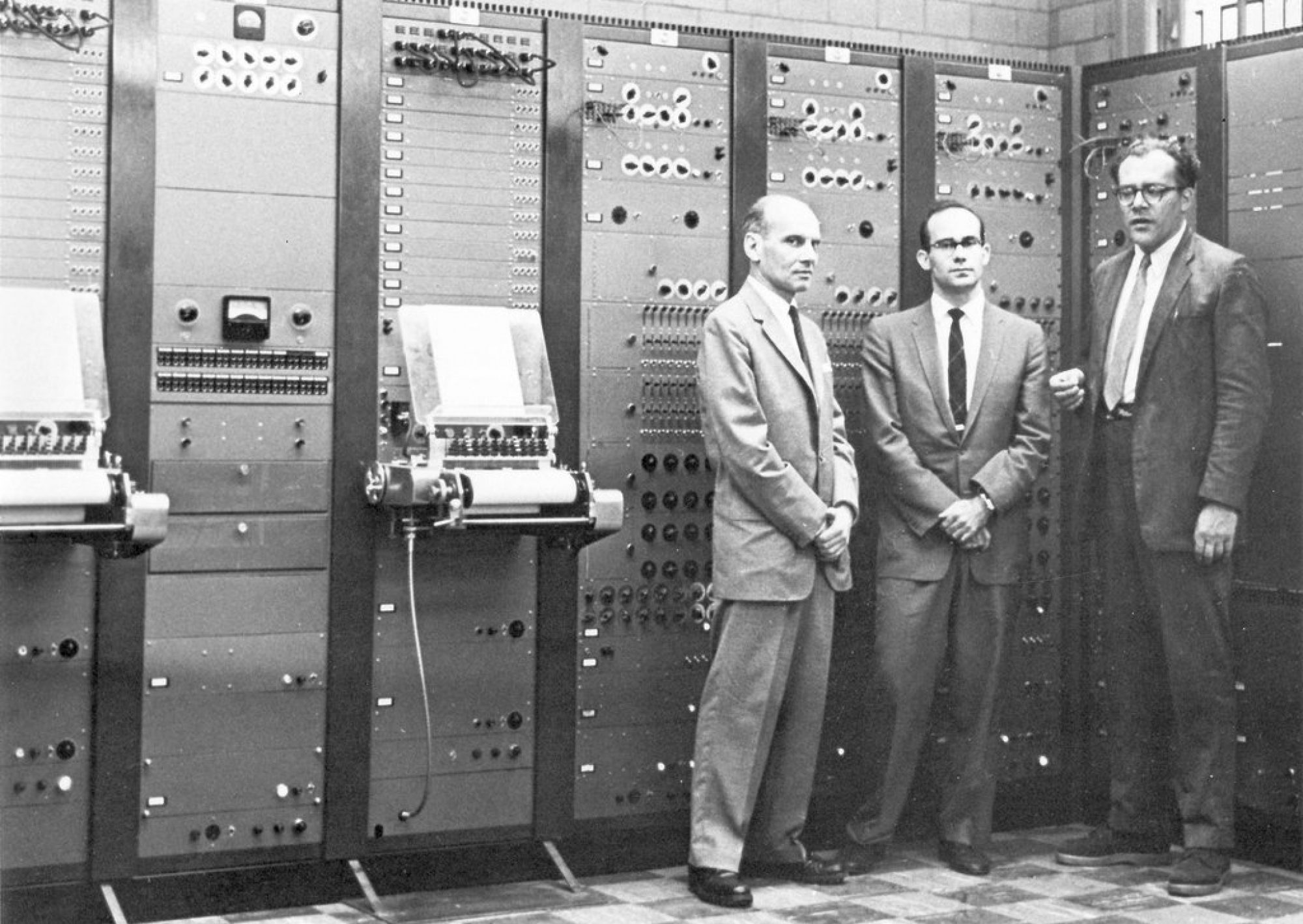Music is a powerful political tool. Throughout history, musicians have written reactionary music to historical events, but in the case of the Vietnam War, this reactionary music shaped an entire political movement, and, on a larger scale, an entire era. This music was very accessible to Americans (thanks to advancements in technology like improved record players and cassette players) so it reached a much larger audience and had a more widespread impact than music from the past. Popular artists like Bob Dylan released folk-oriented, pared-down, anti-war songs like “Blowin’ in the Wind,” which calmly questioned the war through an abstract string of questions. In contrast, the rock band Creedence Clearwater Revival released upbeat songs that were straightforward in their meanings. One of these songs, which grew to basically define the era, was “Fortunate Son.” This song, unlike “Blowin’ in the Wind,” is not an anti-war song, but rather a song meant to draw attention to the inequality of the draft system. Basically, Creedence Clearwater Revival (CCR) wrote this song in response to privileged people evading the draft. The appeal of “Fortunate Son” was so widespread that it not only became an anthem for protestors of the Vietnam War, but also for the soldiers fighting in it. Essentially, CCR used this song as a tool to protest not the war itself, but rather the unequal systems of war in America.
The American political landscape was incredibly tense during the Vietnam War Era. Many young people did not know what the war was about or what they were even fighting for, so, justifiably, they were suspicious about and resistant to the war effort. The reinstatement of the draft further stoked this resistance, as it forced young men to enlist in the military if their birthday was called in a random lottery. This randomized lottery was supposed to create a system in which all men aged 19-26 were equally likely to be drafted to go to war, but as with most “equal” systems in American history, well-positioned people (wealthy, powerful, etc.) were best able to maneuver around the rules of the draft, which meant that society’s most vulnerable members were the most likely to serve in the Vietnam War. Included below is footage from the 1969 Draft Lottery. Although the process does seem random in terms of date number assignments, the disparities began in the next step of the draft process, which was where men enlisted or were exempted
“Fortunate Son” was written in direct response to CCR songwriter Jon Fogerty’s anger about the role of social class and wealth on enlistment. During the year the song was written, 11,000 Americans had already been killed in the Vietnam War. Most of the soldiers killed were poor, and a disproportionately high number of them were black. At the same time, President Nixon’s daughter married President Eisenhower’s grandson, who was given a deferment from the military. Stories like this seemed to populate the news, and it seemed unfair. Wealthy people who had no reason not to be eligible for the military other than their status kept evading the draft. That’s why, as CCR’s drummer Doug Clifford put it, “‘Fortunate Son’ is ‘really not an anti-war song’…“It’s about class. Who did the dirty work?”
In part, this song was received so well due to its accessibility. As Anthony Tommasini wrote, “Nothing impedes the appreciation of classical music — and keeps potential listeners away — more than the perception that it is an elitist art form.” Although he clearly was talking about perceived elitism in classical music, this quote also speaks to the bigger idea of the importance of access and understandability. The lyrics in “Fortunate Son” are very straightforward. Take the following lines, for example:
“Some folks are born made to wave the flag
Ooh, they’re red, white and blue
And when the band plays “Hail to the chief”
Ooh, they point the cannon at you, Lord”
This section of the song speaks to the idea that wealthy people may be patriotic, but when it comes to actual combat, they send people who do not have the power to say no. The ease of listening to rock and roll and the ease of understanding the message of the song are, in part, why it is still such an icon from the Vietnam War Era.
“Fortunate Son” achieved its goal in drawing attention to class disparities of the draft. In fact, it is still used today in popular culture references to the Vietnam War. The opening scene of Forrest Gump (included below) for example, uses the song, and there is a popular meme (also included below) based off of the song being used in so many Vietnam War helicopter scenes.

The fact that the song is still used today is a testament to its effectiveness as a protest tool. The ability of the song to transcend decades and be so closely tied to a social issue demonstrates the high level of power that music can have on politics.
